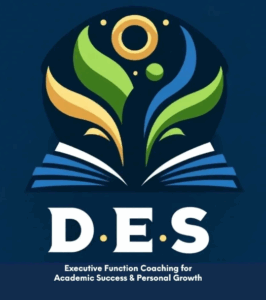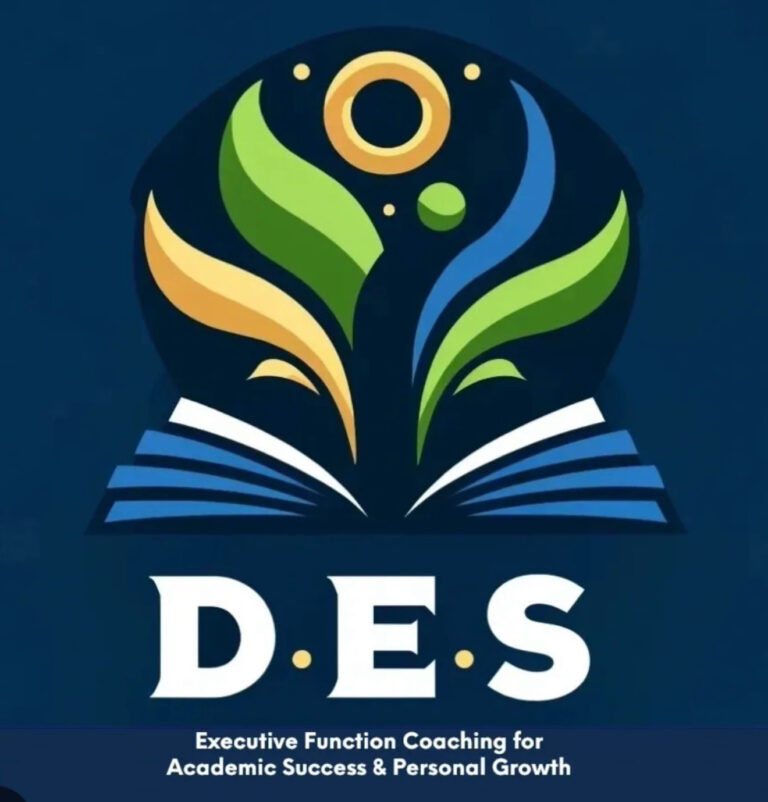Success in school and life depends on more than intelligence or talent. Executive function, a set of mental skills, is the difference maker. These skills include planning, organizing, focus, time management, self-control, and adaptability. A Harvard University study referred to these skills as the brain’s “air traffic control system,” keeping thoughts, emotions, and tasks in order so that a person can actually do what they intend to do.
What happens when those skills don’t come naturally? Or when life throws so much at students that even strong skills aren’t enough? That’s where an executive function coach steps in.
Building Skills for Academic Success
For students, executive function coaches are part mentor, part strategist, and part accountability partner. A coach doesn’t just tell a student to “get organized” or “work harder.” First, it’s about building rapport with the student. Students already know their approach isn’t working. This helps the coach and student find a better approach to their tasks and responsibilities. With rapport and trust, they can start tackling the fundamentals of executive function efficiency. They then begin to break down overwhelming tasks into manageable steps. They create teach tools that can be used across settings:
- Planning ahead for exams, essays, and projects.
- Creating systems to keep track of assignments, due dates, and commitments.
- Improving time awareness, so hours don’t slip away on phones or gaming.
- Developing focus strategies to reduce distractions, both digital and internal.
- Managing emotions like frustration, procrastination, or test anxiety.
Over time, students apply these strategies without needing constant reminders from parents or professors. The goal is not dependency but independence.
Why Demand for Coaches Is Growing
Executive function coaching first gained traction in the mid-2000s as a support for students with ADHD, autism, and learning differences. It has since gone mainstream. As Business Insider reported, more parents, schools, and universities are seeking out coaches to help students. Today, many students — even without a diagnosis — are overwhelmed by modern life’s constant distractions and pressures.
The 2009 Harvard study in Learning Disabilities Research and Practice found that college students with ADHD who worked with coaches for just 10 weeks reported increased motivation, stronger self-regulation, and lower anxiety. Younger students—especially those with diagnoses—benefit even more from ongoing support. This helps them tackle the first hurdles of school responsibilities while building the skills they need long term.
The challenge is that progress isn’t always steady. A student may improve in one area, but then another issue pops up, making it feel like a game of whack-a-mole. Support provides the consistency needed to smooth out those ups and downs and keep growth moving forward. That’s why a student who juggles academics, extracurriculars, part-time jobs, and social pressures can benefit from coaching.
The Impact of Uncertainty and Unpredictability
Students today face more uncertainty than before. The global pandemic, intense politics and ever-present social media removed some structure and predictability in their lives.
This uncertainty and unpredictability is a reason more parents and schools are seeking out executive function coaches. They know their students need help finding structure.
As psychologist J. Russell Ramsay points out, humans in general dislike uncertainty—and people with weaker executive function skills dislike it even more. When focus, memory, or planning already feels shaky, the unpredictability of external events increases stress and self-doubt. This creates a vicious cycle where uncertainty undermines executive function. And weakened executive function makes uncertainty even harder to handle.
For students, this is missing deadlines, panicking during exams, difficulty starting assignments, or even avoiding schoolwork altogether. A coach provides structure and strategies that restore a sense of control in a world that often feels anything but predictable.
COVID’s Lasting Effects
COVID was a turning point in how students and institutions think about executive functioning. Without familiar classrooms and routines, many students were adrift. Even after lockdowns ended, the skills gap persisted. Some students never fully regained the structure they once had. Universities saw record demand for coaching.
Executive function coaches became —and remain—a lifeline for students trying to rebuild skills in planning, accountability, and resilience.
Preparing for a Demanding Future
The need for executive function coaching is not going away. If anything, it’s expanding. As technology fragments attention and external pressures keep rising, there is less structure for students. For students and young adults, learning these skills is an investment not just in academics but in lifelong adaptability.
An executive function coach isn’t there to hand-hold or replace personal responsibility. They’re there to teach strategies, build confidence, and help students create systems that work for them. In a world where uncertainty and unpredictability are here to stay, that kind of support can make the difference between barely scraping by and truly thriving.

